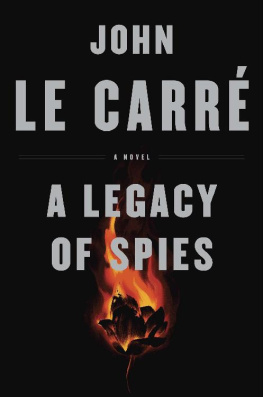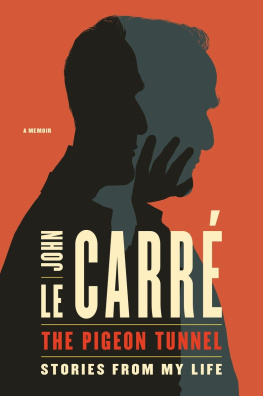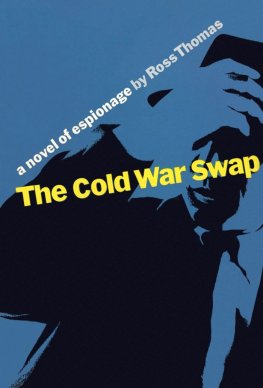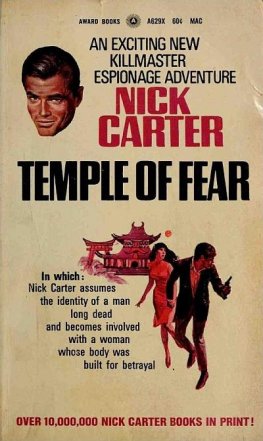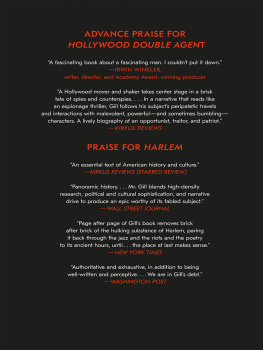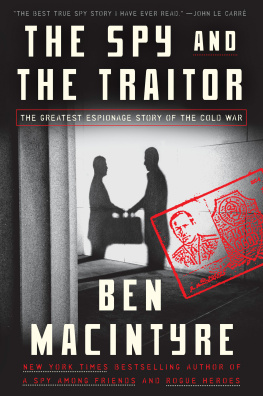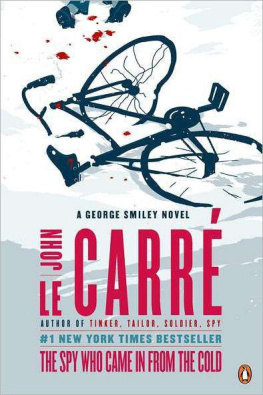John Le Carré - The Spy Who Came in from the Cold
Here you can read online John Le Carré - The Spy Who Came in from the Cold full text of the book (entire story) in english for free. Download pdf and epub, get meaning, cover and reviews about this ebook. publisher: Bantam, genre: Detective and thriller. Description of the work, (preface) as well as reviews are available. Best literature library LitArk.com created for fans of good reading and offers a wide selection of genres:
Romance novel
Science fiction
Adventure
Detective
Science
History
Home and family
Prose
Art
Politics
Computer
Non-fiction
Religion
Business
Children
Humor
Choose a favorite category and find really read worthwhile books. Enjoy immersion in the world of imagination, feel the emotions of the characters or learn something new for yourself, make an fascinating discovery.
- Book:The Spy Who Came in from the Cold
- Author:
- Publisher:Bantam
- Genre:
- ISBN:0-553-26442-7
- Rating:5 / 5
- Favourites:Add to favourites
- Your mark:
- 100
- 1
- 2
- 3
- 4
- 5
The Spy Who Came in from the Cold: summary, description and annotation
We offer to read an annotation, description, summary or preface (depends on what the author of the book "The Spy Who Came in from the Cold" wrote himself). If you haven't found the necessary information about the book — write in the comments, we will try to find it.
The Spy Who Came in from the Cold — read online for free the complete book (whole text) full work
Below is the text of the book, divided by pages. System saving the place of the last page read, allows you to conveniently read the book "The Spy Who Came in from the Cold" online for free, without having to search again every time where you left off. Put a bookmark, and you can go to the page where you finished reading at any time.
Font size:
Interval:
Bookmark:
The Spy Who Came in from the Cold (1963)
A novel by John Le Carr
1
Checkpoint
The American handed Leamas another cup of coffee and said, "Why don't you go back and sleep? We can ring you if he shows up."
Leamas said nothing, just stared through the window of the checkpoint, along the empty street.
"You can't wait forever, sir. Maybe he'll come some other time. We can have the Polizei contact the Agency: you can be back here in twenty minutes."
"No," said Leamas, "it's nearly dark now."
"But you can't wait forever; he's nine hours over schedule."
"If you want to go, go. You've been very good," Leamas added. "I'll tell Kramer you've been damn good."
"But how long will you wait?"
"Until he comes." Leamas walked to the observation window and stood between the two motionless policemen. Their binoculars were trained on the Eastern checkpoint.
"He's waiting for the dark," Leamas muttered, "I know he is."
"This morning you said he'd come across with the workmen."
Leamas turned on him.
"Agents aren't airplanes. They don't have schedules. He's blown, he's on the run, he's frightened. Mundt's after him, now, at this moment. He's got only one chance. Let him choose his time."
The younger man hesitated, wanting to go and not finding the moment.
A bell rang inside the hut. They waited, suddenly alert. A policeman said in German, "Black Opel Rekord, Federal registration."
"He can't see that far in the dusk, he's guessing," the American whispered and then he added: "How did Mundt know?"
"Shut up," said Leamas from the window.
One of the policemen left the hut and walked to the sandbag emplacement two feet short of the white demarcation which lay across the road like the base line of a tennis court. The other waited until his companion was crouched behind the telescope in the emplacement, then put down his binoculars, took his black helmet from the peg by the door and carefully adjusted it on his head. Somewhere high above the checkpoint the arclights sprang to life, casting theatrical beams onto the road in front of them.
The policeman began his commentary. Leamas knew it by heart.
"Car halts at the first control. Only one occupant, a woman. Escorted to the Vopo hut for document check." They waited in silence.
"What's he saying?" said the American. Leamas didn't reply. Picking up a spare pair of binoculars, he gazed fixedly toward the East German controls.
"Document check completed. Admitted to the second control."
"Mr. Leamas, is this your man?" the American persisted. "I ought to ring the Agency."
"Wait."
"Where's the car now? What's it doing?"
"Currency check, Customs," Leamas snapped.
Leamas watched the car. There were two Vopos at the driver's door, one doing the talking, the other standing off, waiting. A third was sauntering around the car. He stopped at the trunk, then walked back to the driver. He wanted the key. He opened the trunk, looked inside, closed it, returned the key and walked thirty yards up the road to where, midway between the two opposing checkpoints, a solitary East German sentry was standing, a squat silhouette in boots and baggy trousers. The two stood together talking, self-conscious in the glare of the arclight.
With a perfunctory gesture they waved the car on. It reached the two sentries in the middle of the road and stopped again. They walked around the car, stood off and talked again; finally, almost unwillingly, they let it continue across the line to the Western sector.
"It is a man you're waiting for, Mr. Leamas?" asked the American. "Yes, it's a man."
Pushing up the collar of his jacket, Leamas stepped outside into the icy October wind. He remembered the crowd then. It was something you forgot inside the hut, this group of puzzled faces. The people changed but the expressions were the same. It was like the helpless crowd that gathers around a traffic accident, no one knowing how it happened, whether you should move the body. Smoke or dust rose through the beams of the arc lamps, a constant shifting pall between the margins of light.
Leamas walked over to the car and said to the woman, "Where is he?"
"They came for him and he ran. He took the bicycle. They can't have known about me."
"Where did he go?"
"We had a room near Brandenburg, over a pub. He kept a few things there, money, papers. I think he'll have gone there. Then he'll come over."
"Tonight?"
"He said he would come tonight. The others have all been caughtPaul, Viereck, Lndser, Salomon. He hasn't got long."
Leamas stared at her for a moment in silence.
"Lndser too?"
"Last night."
A policeman was standing at Leamas' side.
"You'll have to move away from here," he said. "It's forbidden to obstruct the crossing point."
Leamas half turned. "Go to hell," he snapped.
The German stiffened, but the woman said, "Get in. We'll drive down to the corner."
He got in beside her and they drove slowly until they reached a side road.
"I didn't know you had a car," he said.
"It's my husband's," she replied indifferently. "Karl never told you I was married, did he?" Leamas was silent. "My husband and I work for an optical firm. They let us over to do business. Karl only told you my maiden name. He didn't want me to be mixed up with...you."
Leamas took a key from his pocket.
"You'll want somewhere to stay," he said. His voice sounded flat. "There's an apartment in the Albrecht-Drer-Strasse, next to the Museum. Number 28A. You'll find everything you want. I'll telephone you when he comes."
"I'll stay here with you."
"I'm not staying here. Go to the flat. I'll ring you. There's no point in waiting here now."
"But he's coming to this crossing point."
Leamas looked at her in surprise.
"He told you that?"
"Yes. He knows one of the Vopos there, the son of his landlord. It may help. That's why he chose this route."
"And he told you that?"
"He trusts me. He told me everything."
"Christ."
He gave her the key and went back to the checkpoint hut, out of the cold. The policemen were muttering to each other as he entered; the larger one ostentatiously turned his back.
"I'm sorry," said Leamas. "I'm sorry I bawled you out." He opened a tattered briefcase and rummaged in it until he found what he was looking for: a half bottle of whisky. With a nod the elder man accepted it, half filled each coffee mug and topped them up with black coffee.
"Where's the American gone?" asked Leamas.
"Who?"
"The CIA boy. The one who was with me."
"Bedtime," said the elder man and they all laughed.
Leamas put down his mug and said, "What are your rules for shooting to protect a man coming over? A man on the run."
"We can only give covering fire if the Vopos shoot into our sector."
"That means you can't shoot until a man's over the boundary?"
The older man said, "We can't give covering fire, Mr..."
"Thomas," Leamas replied. "Thomas." They shook hands, the two policemen pronouncing their own names as they did so.
"We can't give covering fire. That's the truth. They tell us there'd be war if we did."
"It's nonsense," said the younger policeman, emboldened by the whisky. "If the allies weren't here the Wall would be gone by now."
"So would Berlin," muttered the elder man.
"I've got a man coming over tonight," said Leamas abruptly.
"Here? At this crossing point?"
"It's worth a lot to get him out. Mundt's men are looking for him."
"There are still places where you can climb," said the younger policeman.
"He's not that kind. He'll bluff his way through; he's got papers, if the papers are still good. He's got a bicycle."
Font size:
Interval:
Bookmark:
Similar books «The Spy Who Came in from the Cold»
Look at similar books to The Spy Who Came in from the Cold. We have selected literature similar in name and meaning in the hope of providing readers with more options to find new, interesting, not yet read works.
Discussion, reviews of the book The Spy Who Came in from the Cold and just readers' own opinions. Leave your comments, write what you think about the work, its meaning or the main characters. Specify what exactly you liked and what you didn't like, and why you think so.




